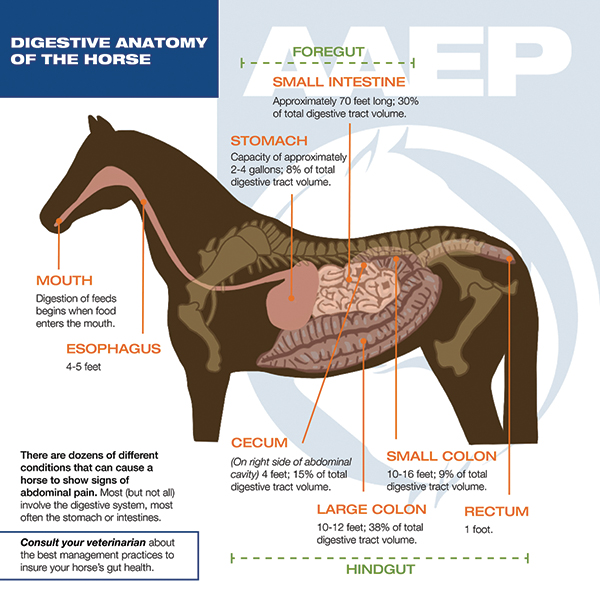When grooming or caring for your horse, have you noticed that its hindquarters appear dirtier than usual? Perhaps they remain stained no matter how frequently you bathe them. You might also observe that the stall walls or bedding seem excessively soiled. Your horse could be experiencing Free Fecal Water Syndrome (FFWS).
This condition remains shrouded in mystery due to limited scientific research and a lack of understanding regarding its causes. Fortunately, there are effective treatments available that can help reduce or even eliminate the symptoms of FFWS.
What is FFWS? FFWS is a condition in which horses produce both solid and liquid phases during defecation. Dr. Jennifer Windham with Full Circle Equine Veterinary Services in Olive Branch, Mississippi, says, “Horses affected with FFWS void feces in a solid phase and a water/liquid phase. It has previously been seen as a management issue in healthy horses. Studies comparing the microbiome of horses with FFWS to healthy, unaffected horses showed no substantial differences between the groups and FFWS has not been linked with infectious causes of diarrhea.” When a horse is affected with FFWS, the liquid phase of defecation can cause stains around the anus, hind legs and tail which can lead to skin irritation and inflammation. FFWS can last up to days to even months and can change in severity over time.
What are FFWS Symptoms? FFWS symptoms are sometimes overlooked since some owners view FFWS as a cosmetic and maintenance issue. Common symptoms can include fecal matter soaking the anus, hind legs, and tail area, skin lesions and irritation requiring frequent washing, defecation discomfort, stall walls and bedding soaked with fecal water, and bloating. Dr. Jennifer says, “In severe cases, horses can experience dermatitis/scalding of the skin of the perianal region, weight loss, and decline in condition.”
What causes of FFWS? Unfortunately, there is limited research on FFWS but with the spotlight on FFWS, more research is in development. “Practitioners have reported underlying conditions that could potentially be associated with the syndrome that are important to keep on your radar. These include equine gastric ulceration, IBS/gut inflammation, sand accumulation in the gut, and/or a diet consisting of variations in hygiene and makeup. Other potential contributing factors that have been considered this syndrome, include horses that are of lower rank in the social hierarchy of the herd and horses in confined places in the winter causing anxiety” according to Dr. Jennifer Windham.
How to Treat and Manage of FFWS: To treat and manage FFWS, Dr. Jennifer recommends, “Changing or reducing the size of turnout groups, gradual changes in diet with input from your veterinarian, providing less bulk in the feed by feeding chaff, chopped hay, or hay pellets, adding omega-3 fatty acids or probiotics, reducing starch in the diet or other supplements that can aid in digestive health and balance.”
While not life threatening, FFWS can still become a serious issue if not management and treated accordingly. Always pay attention to your horse’s defecation patterns anytime there is a sudden change in their lifestyles such as change in diet or social hierarchy in turnout. Any questions about FFWS, please contact your horse’s veterinarian and/or your county’s Extension office.

Article by Kyla Szemplinski, MS, UT TSU Shelby County Extension
Kyla Szemplinski, MS, is an Extension Agent I and 4-H Agricenter Youth Development for UT TSU Shelby County Extension. She serves Shelby County, Tennessee equine community, and can be contacted at the Shelby County office at 901-752-1207 during normal business hours Monday-Friday 8am-4:30pm CST.







